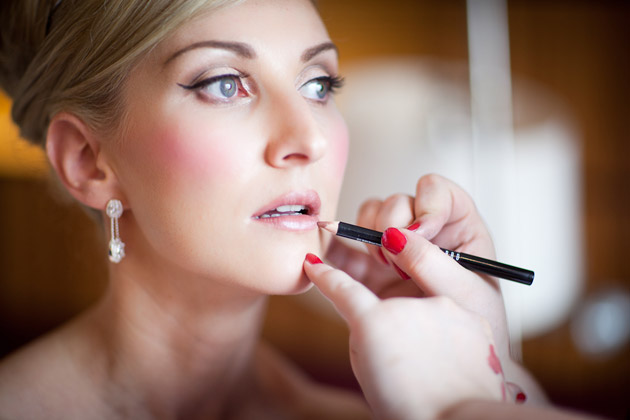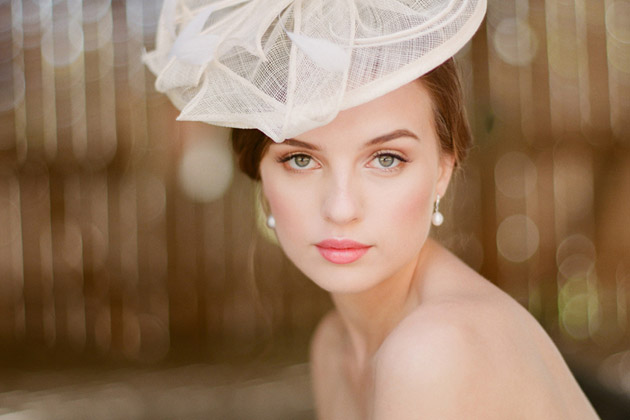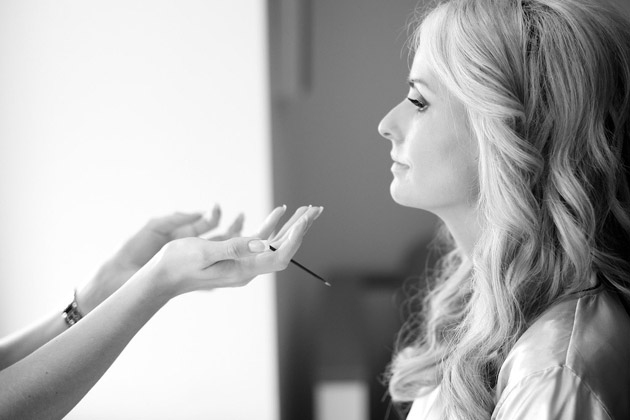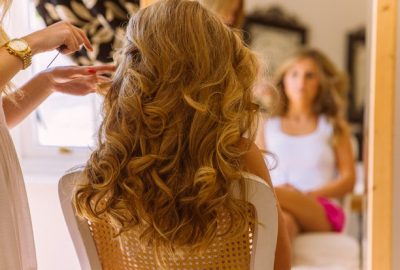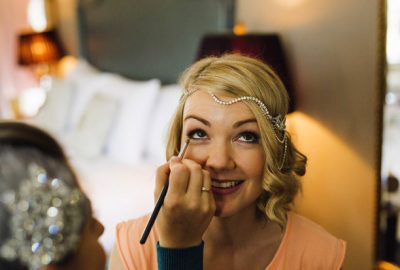Image courtesy of Louise McMahon
What kind of a woman are you – one that wears make-up every day, just a little to enhance your features, or do you boldly go wherever the trends take you? Or, are you completely clueless, forever worried that your make-up attempts look like a 3-year-old drew on your face? No matter what your feelings are on the subject, you’ll re-evaluate everything come your wedding day.
The internet is full of advice on what to do and ask before you book your make-up trial, and yet many brides come away with a feeling of unexplained disappointment, not quite getting the results they wanted. That could be because most of this advice centres around booking questions (i.e. what happens if you fall ill on the day? Is the deposit refundable? How much extra for bridesmaid make-up?) But you may need something entirely different.
We sat down with Professional Make-up Artist Louise McMahon to get the absolute low down on all things wedding make-up. Ladies, this is your complete, no-nonsense guide to getting the most from your trial – the ultimate guide to what you should expect and what you should ask for.
Share this with all the brides you know – we guarantee they’ll be grateful!
Make-up by Louise McMahon
Photo inspiration
The first port of call for brides when it comes to deciding on a make-up look for their wedding day is pictures, scouring the web and the likes of Pinterest for pictures of celebs or other brides with a view to replicating their make-up looks! Louise says it’s best to collect as many pictures as you can as inspiration but to keep in mind make-up is an individual thing:
“Most brides bring pictures of a look they like, and say ‘I want these eyes, or these lips’. I say – the more pictures the better, but there’s one very important thing to keep in mind – the celebs and models in those pics look a certain way because you see a COMPLETE look created for them, with all parts working together. The pictures are often digitally altered to look even better.
“They may also have a completely different colouring to yours – if you’re a pale blonde ethereal beauty, but you bring a picture of Kim Kardashian… her look just won’t work for you. It can be modified and adjusted to fit you, but you must be realistic – if you come away from the trial thinking ‘I look nothing like Kim Kardashian’, that’s because you’re not Kim Kardashian. But, can you get something similar that suits your colouring better? Absolutely, yes. Always keep in mind that make-up is a very individual thing, there is a look that’s best for YOU – and we’re here to find it together, at your trial.”
Image from Edel & Rory’s real wedding
Those perfect eyes
When you look in the mirror, what do you see? Do you think your nose is too big, your eyes are too close together, or your lips are not plump enough? This is because you’re looking at isolated features – but when others look at you, they see the whole look. Thinking this way makes you focus on your imperfections, rather than how your features work together to make you – you.
Louise suggests chatting with your make-up artist and talking them through your features, what you like and don’t like: “I always ask clients to tell me about their face, tell me what they love about it and which features they want to enhance. Even if you haven’t got a clue what kind of look you’re after for your wedding, it’s immensely helpful for your make-up artist to know which parts of your face you like and dislike. This is good, solid information that really gives us something to work with.
“Before you come over, think about the compliments you receive and equally about those parts of your face you’d put a paper bag over, if you could. Everyone hears things like – beautiful eyes, long lashes, glowing skin, dazzling smile, perfect eyebrows. Tell me – I want to know. Equally important – tell me about what you don’t like. You think your nose is too big? I can fix that. Eyes too small? I’ve got just the trick. No cheekbones? No problem. I can work with it if you tell me about these things, so that you look and feel amazing on your big day”
Bridal make-up
When it comes to your look, if your make-up artist is working away with his or her brush and you’re not happy with what you see, it can be scary to interject and say, ‘Actually, I hate this’! But Louise says, don’t be afraid to pipe up if you’re not sure about something – communication is key:
“Only 20-30% of all the brides I ever worked with knew exactly what they wanted. The rest don’t know at all, or have only a vague idea. Don’t worry – this is perfectly okay! It’s the make-up artist’s job to ask the right questions and to make suggestions, things we think may work, all you need to do is have an open mind and give your honest opinion. We KNOW that this is one of the most special days of your life – and we want you to look your absolute best. No make-up artist ever wants to make a bride look bad, so it’s all about communication. Don’t ever be afraid to say you don’t like something – you may not realise this, but it’s only a matter of minutes to take the make-up off and apply something new until we find the look you are happy with.”
“It’s true that a bride may not be comfortable telling her make-up artist about something she doesn’t like – whether it’s because she’s too polite, afraid to hurt the artist’s feelings, or she simply doesn’t what exactly she doesn’t like and can’t explain it. Don’t worry about any of these things – just say what’s on your mind. And if you don’t know precisely what it is – we’ll make suggestions on how to improve the look. It’s all about communication – don’t be afraid to say what’s on your mind.”
Image courtesy of Elizabeth Messina
Your essential make-up vocab
With Louise’s help, we’ve put together an essential list of phrases commonly used by make-up artists. If you’re one of those brides who aren’t well acquainted with the lingo, this will go to great lengths to help you ask for what you want, or describe what you like. Here it is…
Matte look – a shine-free complexion, eliminating any oiliness from the skin. No obvious glow.
Dewy look – the opposite of matte, the skin has an overall radiant glow. The skin looks natural and fresh. This look highlights your complexion in key places where the light would naturally hit the face (like top of cheekbones, brow bone etc.)
Contouring – is the art of shading and highlighting using lighter and deeper shades of foundation to really accentuate or lessen certain features of the face. This is make-up taken to the next level – from pretty girl to cover girl. Spectacular photos are guaranteed – don’t be scared to ask for contouring if you’ve never had it before, it may turn out to be the best thing you’ve ever asked for.
Strong brows/eyes/lips – ‘strong’ means your chosen feature will be the one that’s darkest, strongest in colour, and most striking. For example, if it’s your eyes you really want to stand out, ask for strong eyes, and let the make-up artist decide how to balance the rest. Sometimes strong lips and strong eyes look great together, sometimes only one of them – it’s different for every woman and depends on your own personal taste.
Filling in brows – You have all probably heard this one before but never underestimate the importance of your brows, they are paramount to your overall look. They really do ‘frame the face’. Without some form of filling in, the brows can disappear amongst the other make-up and ruin the overall look, especially in your photos. Just let your make-up artist know how strong you usually wear them or how much you usually fill them in. Or if you never go near them, let your make-up artist know this too so they can determine the right level for you.
Highlight – this is a technique to accentuate areas where light naturally hits the face, usually using a powder/cream with an iridescent glow/shimmer. So if you want your eyes to be the focus, don’t say “highlight my eyes” – say “strong eyes”. Highlights are used literally to bring out your natural features – see contouring, above.
Bronzed look/sunkissed – it doesn’t always mean ‘orange’, although if you really want that orange look, just say so! Bronzed will make you look like you’ve just come back from a few days in the sun. This is very popular with summer brides, obviously.
Natural look – enhances your face without drama, usually just a tone or two darker on your lips, and accentuating the eyes in the freshest way. Too little make-up is just not worth the effort, it’ll be immediately obvious in the photos.
Smokey eye – there are many variations of this, and there are many levels of smokey – depths and hues make a big difference. One persons smokey may be quite a natural look to someone else so tell your make-up artist how dark/smokey you want to go – it can be as light as a midnight fairy, or as dark as a 1950s femme fatale.
Blusher – if you don’t wear it every day you may be a bit hesitant, but you will need some blush – it can make an incredible difference, especially in the photos as the flash can bleach/wash you out. Applied to strategic areas of the face, the blush will prevent your make-up from looking flat and will give you a natural healthy pop of colour. Strong or light are your guiding words.
Sparkle look – brides ask for this mostly in relation to their eyeshadow. While it looks pretty in the mirror, it completely changes in appearance once a photographer’s flash comes anywhere near you – sparkle should be used very sparingly, just a light whisper across the eyelids. Don’t be surprised if your make-up artist tries to change your mind about this – unless your wedding happens to be a cabaret show.
Make-up by Louise McMahon
Important questions to ask your make-up artist
Louise says: “In addition to your standard questions about the booking itself, there are some other, even more important things you should ask when deciding if you should book a trial.” They are as follows:
1. Do you have a style you specialise in?
2. Do you feel comfortable doing natural/strong make-up?
3. Have you done/do you have experience in doing a certain style – for example – 50s vintage?
4. Is it okay if I don’t know my hairstyle yet?
5. When finished, can I keep the make-up on and wear it home?
6. Is it okay if I don’t have my dress yet?
7. Can I take my own photos during the trial, or will you email me the photos you’ll take?
Louise says: “When it comes to hair and dress, it does help if you know already, but if not – it’s not a major worry. It does help to have a general style idea, for example – are you having a vintage wedding? Which era – it can mean anything from Marie Antoinette to 1980s. Is your dress any colour other than white/ivory? What colour are your accessories? The question of colour is especially important for bridesmaids who wear coloured dresses.”
Image from Grainne & Stephen’s real wedding
Before your make-up trial
– Think of the parts of your face you like and dislike the most
– Find photos of looks you like, but remember to use them as a guideline only – your make-up artist will find the look that’s similar to the one you love but will customise it so it works best for you
– Get the colours right – both your favourites, and your dress/bouquet/ accessories
– If you want a strong lip – are you prepared to touch it up throughout the day? A strong lip requires more upkeep than a natural one
During the make-up trial
– Share all of the above with your make-up artist
– Don’t be afraid to say what you like or don’t like – they can only fix it if you tell them. Remember, it’s very easy to remove make-up and apply something else
– If you don’t quite like the look, but you can’t pinpoint what it is – don’t keep quiet about it, speak up – your make-up artist will find the answer
– Be open to suggestions – Similar to shopping for your wedding dress, you may find that your perfect gown is one you thought you would never have considered. The same may apply for your make-up look. Let the artist show you what they think would suit you best
– Don’t hurry – ample time has been allocated to find your perfect look– and as with any masterpiece, it takes time to get it right
After your make-up trial
– Leave the make-up on for a few hours – you will be wearing it all day on your wedding day, so it’s your chance to check how well it’s going to hold up
– Look at yourself in your own mirror at home, have photos taken in different light, compare them with photos from the trial – take the time to really study your look in detail
– Discuss any changes with your make-up artist if necessary – any changes you would like to make to specific areas, for example – softer eyes, stronger lips etc.
– Don’t let too many people influence your opinion – the only one that counts is yours
For more info on Louise McMahon, or to find out if she has your wedding date free, check out her weddingsonline profile


